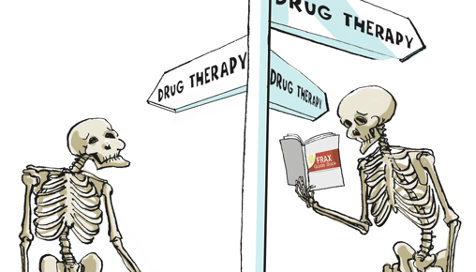
Is boosting bone mass through pharmacotherapy really the best way to prevent fractures in the elderly?
When I first met Teppo Järvinen, it felt like I was meeting a celebrity (not like a Mick Jagger celebrity, more like a David Sackett celebrity). Teppo is the senior author on the NEJM article, Arthroscopic Partial Meniscectomy versus Sham Surgery for a Degenerative Meniscal Tear. For anyone interested in medical reversal, this article is up there with CAST, the WHI, and the vertebroplasty articles as landmark articles.
I think today’s article is instructive for its view of how hard it can be to do the research and develop an argument to question an accepted practice. Dr. Järvinen outlines the work he and his colleagues have done that question our current approach to preventing fractures in the elderly. The currently accepted practice is to screen people for osteoporosis with bone density studies. Those with osteoporosis (defined as being at least 2.5 standard deviations below the young adult peak) are considered at high risk for future fracture. A number of medications are recommended to increase bone density in order to prevent future fracture.
You might get to the end of this article and think, why has there not been an RCT comparing different approaches to fracture prevention in the elderly? This might take the form of a trial that compares improving bone mass pharmacologically, fall prevention (or lessening the impact of falls) and a combination of the two.
Adam Cifu
Contrary to the sadly, still persisting view that fractures of older adults are primarily due to bone fragility (osteoporosis), my PhD supervisor-to-be, Dr. Pekka Kannus published a series of studies (1-5) – many in top-tier general medical journals – that convincingly showed that fractures in the older adults are primarily due to falling and the resulting direct impact on the fracture site.
Among these, my favorite one was a prospective 25-year follow-up of a nationwide cohort of elderly Finnish twins to determine whether genetic factors partly explain variation in risk of osteoporotic fracture. While it was firmly established that genetic factors have a substantial role in explaining age-specific variation in bone mass and density, the findings of this study showed that susceptibility to osteoporotic fractures in elderly Finns was not strongly influenced by genetic factors, especially in elderly women. The authors (Dr. Kannus et al.) concluded: “The traditional strategy for prevention of osteoporotic fractures -- that is, increasing peak bone mass and preventing age related bone loss -- should be changed to include new elements such as prevention of falls and protection of the critical anatomical sites of the body when a fall occurs.”
Given these findings, a research team led by Dr. Kannus first developed a scientifically sound hip protector (6-8). The same team went on to show that people were willing to wear the hip protector and then, finally, that this device could effectively prevent hip fractures.
During the time this work was being done, I was working as a PhD student in the Bone Research Group of the Urho Kaleva Kekkonen Institute led by Drs. Kannus and Harri Sievänen. Inspired by their work, I decided to follow on this somewhat unconventional path in the field of osteoporosis. The research led to the recognition of following discoveries – or intellectual paradoxes:
Paradox 1: Dual x-ray absorptiometry (DXA) is an uncontested diagnostic tool for assessing “osteoporosis” or “bone mineral density, BMD” but when placed under proper scientific scrutiny, it fails.
Our research (9, 10) showed that BMD inaccuracies as high as 20% or more can be readily anticipated clinically, particularly in cases of osteopenic, osteoporotic, and elderly patients. What does this mean? The clinical relevance of this uncertainty is analogous to getting a blood pressure (BP) reading of 160/100 mmHg and realizing that, with similar uncertainty, the true value could lie between 140/88 and 180/112 mmHg. How comfortable would you be making treatment decisions on a patient with elevated blood pressure if your BP measurement was this unreliable?
Of note, we tested all available DXA scanners (i.e., Hologic, Lunar, and Norland densitometers) and the inaccuracies were found to be virtually the same irrespective of the scanner used.
Paradox 2: An early solution to paradox 1, was to adopt the concept of bone quality. This was a concept without a scientific foundation.
Bone quality was a concept widely embraced in 2005, as it allegedly offered a solution to one of the classic paradoxes in the osteoporosis field: while low BMD values were convincingly shown to be associated with increased risk of fracture at the population level, the predictive value of BMD in an individual patient remains marginal. So, there had to be something “unknown” that was not captured by the DXA-derived BMD – and this unknown was named “bone quality”. The National Institute of Arthritis and Musculoskeletal and Skin Diseases (NIAMS) and the American Society for Bone and Mineral Research (ASBMR) even hosted a special conference on this topic, entitled "Bone Quality: What Is It and Can We Measure It?"
The concept of bone quality made no sense to Drs. Kannus, Sievänen and me. Our concern was that bone strength (resistance to fracture) provides the ultimate measure of true bone quality. The paradox of osteoporosis comes from our inability to determine accurately the true bone strength of an individual. However, this inability cannot be taken as a justification to introduce an obscure and ill-defined concept such as bone quality. We published two papers arguing that “bone quality” was an “empty term.” We compared it to the emperor’s new clothes. After its popularity in the early years of the 21st century, the term “bone quality” has fallen into disuse.
Why discuss a term that is not even used anymore? The brief obsession with bone quality demonstrates how prone to adopting meaningless measures this field is.
Paradox 3: Fractures are due to falling, not osteoporosis.
Dr. Kannus’ seminal work had already established that fractures in the older adults are primarily attributable to falling, not osteoporosis. Dr. Kannus went on to publish a number of articles about the prevention of falls (11-13). Despite the evidence that exercise effectively prevents falls and fractures, most healthcare professionals opted to stick to the “conventional truth” in fracture prevention of medicating their patients in hopes of improving bone mass or preventing bone loss. (Probably the most cited work that supports this approach is a study published in 1996, showing that, in high-risk patients, medical treatment with alendronate, reduced the risk of clinical fracture by 4.6% -- NNT 22 -- while having no effect on reducing hip or wrist fracture. A helpful meta-analysis is here.)
Our next step was to write papers calling out the above noted issues. The first of our papers, published in the BMJ, was a comprehensive review that highlighted the fact that those concerned about the ‘fracture epidemic’ should be putting their efforts into stopping falls - not treating low bone mineral density (osteoporosis).
The paper gained attention from international news media (e.g., the BBC, BBC radio, CNN, much of Finnish news media). Some guidelines even began to include fall prevention as a critical element.
Paradox 4: Preventive pharmacotherapy is not feasible.
Three years later we published a second analysis in the BMJ. This article went beyond discussion of fracture prevention and treatment to challenge the feasibility of preventive pharmacotherapy. We challenged the claim that preventive pharmacotherapy was “cost-effective” (a claim made by many expert panels across disciplines: statins and anti-hypertensives in the prevention of cardiovascular disease; bisphosphonates in the prevention of fractures).
We articulated the fundamental problem with the current cost-effectiveness models that the data underpinning the efficacy of the drug cannot be directly extrapolated into real-life scenarios. In essence, the models extend the highly specialized evidence on drug efficacy as if it were widely applicable in community practice. In economic jargon, the prevailing data that are proposed are merely one element of a sensitivity analysis – and the very favorable elements at that.
This was also the first time that we teamed up with the BMJ artist Malcolm Willett. We asked Malcolm if he would consider producing artwork for our paper. After reading our manuscript, Malcolm emailed us this fantastic art that truly captures the essence of our paper!
Paradox 5: A diagnostic change that made no sense to us.
To those who have followed the diagnostic evolution of other “major non-communicable disease”, the next rabbit pulled out of the hat by the osteoporosis community may sound familiar – It was a re-make of the treatment target: Instead of diagnosing/testing for osteoporosis, campaigns were endorsing the use of fracture risk prediction tools. ‘High fracture risk’ was the new orange at the time, exactly the same “shift” that had taken place a few years earlier in the fields of hypertension, hypercholesterolemia, and type II diabetes!
As laudable and intuitively rationale as the approach of calculating a fracture risk score to identify those at ‘high fracture risk’ seemed at the first glance, we were troubled by the very same fundamental problems:
1. If fractures are primarily caused by falls and not osteoporosis, why isn’t fall risk incorporated into the prediction equations?
And more importantly:
2. Why is pharmacotherapy the only ‘fix’ for those identified at ‘high fracture risk’ instead of exercise, as a more effective, safer and less costly an alternative?
Sadly, the osteoporosis community adopted the focus on fracture risk change with no need for solid evidence.
While building our case to challenge the strategy, professors Karl Michaelsson (Uppsala University) and Gary Collins (Oxford University) published a critical piece that dissected the FRAX tool, showcasing all the flaws related to the performance of the tool. At the time, the FRAX™ was the most widely-endorsed fracture prediction instrument and one that was allegedly developed under the auspices of the WHO.
We teamed up with these world-leaders on osteoporosis/fracture prediction, to scrutinize other concerning issues related to the FRAX™ tool. This collaboration resulted in a Commentary published in the CMAJ.
In brief, we expressed concerns about the development and promotion of FRAX™, including lack of transparency about the underlying equation, use of one co-developer’s “own journal” to promote and defend it against critique, and apparent violations of guidelines for handling conflicts of interests.
Paradox 6: Overdiagnosis of bone fragility…
As there had still been no change in practice – the world was still screening for osteopenia and osteoporosis and treating the results of bone density studies rather than focusing on fall prevention -- our team decided to write a paper to gather all the information together related to the screening and treatment of individuals at risk of fractures. This became our third BMJ analysis.
Backlash
It came as no surprise to us that our peers were not happy with our publication. In fact, the major osteoporosis advocacy groups/bone organizations sent their responses to the BMJ and encouraged their supporters to do the same. The BMJ “mailbox” was filled with rapid responses criticizing our paper.
The advocacy organization also published their counterarguments on their own websites and in their journals.
The following statements were made about our papers:
· “inflammatory”
· “The article distorts and grossly misrepresents the osteoporosis burden”
· “confuse and mislead the public and the medical community with inaccurate and harmful conclusions”
· “deem[ed] inaccurate and misleading on a number of levels”…
Maybe not surprisingly, despite having published influential papers that led to a backlash in the journals, neither me nor any of my colleagues in this work have been invited to a bone meeting to discuss our ideas. I once agreed to participate in a debate with a named opponent. The debate was later cancelled on the grounds of “…failing to find somebody interested to share [take the opponent’s role] in this debate”.
Where are we now?
Today, being at higher risk of developing a disease has become a disease in and of itself. An otherwise healthy person’s high blood pressure, elevated serum lipids, or low bone density become chronic conditions. But what represents ‘high risk’ and how should it affect care, particularly with respect to pharmacological primary prevention?
Together with my collaborators, I am proud to have called into question the practice of preventing and treating fractures in the elderly by boosting bone mass using osteoporosis drugs. I believe we have argued successfully that this approach does not stand scientific scrutiny.
Teppo Järvinen is a professor of Orthopaedics and Traumatology at the University of Helsinki and Helsinki University Hospital. He leads a research group called FICEBO (Finnish Centre for Evidence-Based Orthopaedics, www.ficebo.com).
1. https://www.ncbi.nlm.nih.gov/pubmed/10441647
2. https://www.ncbi.nlm.nih.gov/pubmed/9915707
3. https://www.ncbi.nlm.nih.gov/pubmed/10567136
4. https://www.ncbi.nlm.nih.gov/pubmed/11199185
5. https://www.ncbi.nlm.nih.gov/pubmed/12162489
6. https://www.ncbi.nlm.nih.gov/pubmed/8686498
7. https://www.ncbi.nlm.nih.gov/pubmed/9075632
8. https://www.ncbi.nlm.nih.gov/pubmed/10456390
9. https://www.ncbi.nlm.nih.gov/pubmed/11204442
10. https://www.ncbi.nlm.nih.gov/pubmed/11341324
11. https://www.ncbi.nlm.nih.gov/pubmed/11563210



















Your article hit home (I had a specific experience in exactly this area some three and a half years ago, precipitated by a hard fall on my tailbone on an icy cross-country skiing track {19 March 2020}, 1st Corona lockdown by the way), which resulted in considerable pain in my mid-spine which did not dissipate 6-8 weeks later {even after the primary tailbone pain went away}.
At the time I was 60, slightly overweight: BMI 28, physically active (skiing, cycling, mountaineering) and in otherwise robust health.
My doctor diagnosed a hairline crack on the vertebra in question; whereupon he recommended that I visit his colleague, a rheumatologist / bone density specialist, while highlighting that the entire procedure would be covered by my health insurance (nota bene not accident insurance), thus there would be zero financial risks for me. (This struck me as odd, since the clear cause of the pain was a brutally hard, high-speed fall right on my tailbone. But he was the doctor, after all, so I deferred to his recommendation and agreed to the appointment with the specialist).
My visit to the specialist’s office was marked by some very tendentious questions and a bizarre back and forth with the specialist’s assistant on signing a liability release form, should for whatever reason the diagnostic procedure not be covered by my health insurance. I never actually met the rheumatologist himself (only his assistant).
Ultimately, the specialist determined from the bone scan results, the questionnaire which I had completed and his assistant’s notes that I suffered a considerably enhanced risk of future bone fracture, so he strongly recommended that I be put on drug therapy for 3-5 years to increase my bone density. My doctor agreed. I had some questions on the interpretation of the bone density scan results and how these translated into their recommended therapy, so I set up an appointment with my doctor to discuss.
Fortunately, I asked my personal doctor some pertinent questions (e.g., the designation of the drug he and the specialist were prescribing, its mechanism for combatting my purportedly low bone density as well as any known side effects); upon which he expressed frustration with my curiosity. He said he didn’t know answers to any of these questions, so he’d have to get back to me later (but it wouldn’t be the following week). I responded that it would be fine to wait longer; after all, it was my body which would be subjected to a 3-5 year drug treatment, so I preferred to inform myself accordingly, even if that meant a delay of several weeks.
To make a long story short, I never heard back from my doctor. I changed doctors thereafter. Needless to say, I did not undergo any drug therapy.
The entire experience left me wondering who was at the center of our healthcare system: was it the patient, or was it the pharmaceutical manufacturers? Were the medical professionals benefitting financially from their recommended therapy? If so, wouldn’t this constitute a conflict of interest?
I wonder how many other individuals have been subjected to similar pressure tactics... dare I say gaslighting?
Thank you for this! My favorite quote came at the end, "Today, being at higher risk of developing a disease has become a disease in and of itself. An otherwise healthy person’s high blood pressure, elevated serum lipids, or low bone density become chronic conditions." This sums up our current situation in health care, and carries the potential to spark a rich conversation full of interesting perspectives.